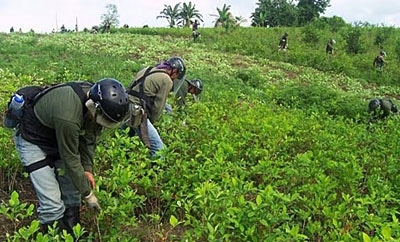The European Union (EU) has announced an aid package worth $41 million to help Peru fight drug trafficking, underlining the Andean nation’s key position in the international drugs trade.
The money would support Peruvian anti-drug efforts until 2016, said Hans Allen, head of a EU delegation in Lima, noting that Peru had a wide-ranging strategy including alternative development programs, seizure operations, and the strengthening of police, border and customs agents.
The EU would support specific alternative development programs, in which coca leaf growers are helped to cultivate and sell other crops, said Allen, highlighting a project in the eastern province of Satipo, where 200 farmers have been given modern equipment and help selling their produce in commercial markets.
Aiding Peru’s fight against drug trafficking was an EU “priority,” said Allen, reported news agency Andina.
InSight Crime Analysis
Between 2007 and 2013, Bolivia received far more EU aid than Peru, an estimated $356 million compared to Peru’s $171 million, with $102 million specifically dedicated to tackling drug trafficking and production, whereas Peruvian anti-drug aid was incorporated into wider strategic initiatives. This new EU package is a reflection of Peru’s increased importance in the international drugs trade — according to the United States, Peru overtook Colombia last year to become the world’s leading producer of cocaine.
Whereas US anti-drug assistance has typically had a strong emphasis on strengthening the security forces in Latin America, such as the multi-billion dollar Merida Initiative, the EU has often taken a more development-based approach. Previous EU anti-drug assistance in Latin America has included a $2.5 million demand reduction program in Venezuela, a $25 million alternative development program in Bolivia’s Chapare region and $28.6 million to improve infrastructure in the Pozuzo and Palcazu areas of Peru.
As reported by Insight Crime, a five-year project funded by the EU promoting alternative development in Bolivia has helped reduce coca cultivation by 12 percent in some areas, according to state officials. Peru and the EU signed a pact last year agreeing to cooperate to promote alternative development in the Andean nation — however, since then the Peruvian government has pursued an increasingly hardline approach towards coca growers.

